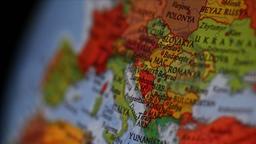Could Turkey ever be ruled by a coalition? This was the question on everyone’s minds in the last couple of months. I believe that the answer to this question lies in the magical phenomenon that we call “trust.” If the parties can trust one another, a coalition will work out; otherwise, the system will hit an impasse. It’s a straightforward way of reasoning: Just as spouses who distrust one another can’t work out their marriage, just as two partners who distrust one another cannot manage their company together, two or three parties that distrust one another will unfortunately fail to form a coalition and rule the country.
And do you think political parties in Turkey can trust one another? We have a serious problem there if our political parties have the same DNAs as our people, and hence our society. Because Turks don’t trust one another. If you beg to differ, I suggest you take a glance at the table below. Turkey is one of the countries in the world where interpersonal trust, i.e. the rate of people who positively respond to the question “Generally speaking, would you say that most people can be trusted, or that you can’t be too careful in dealing with people?” is at its lowest levels. Turkey ranks third from the bottom among the 29 countries where the World Values Survey was held in the 2005-2014 period. Only 8% of Turks say they trust others, whereas the figure stands at 37% in the US, 49% in Australia and 63% in Sweden. Hence, while we Turks can almost only trust our immediate family members, the Swedes consider half of the country as their family and place trust in them.
Table 1: Interpersonal Trust. How many out of every 100 say most people can be trusted?
|
Low level of trust |
|
Medium level of trust |
|
High level of trust |
|||
|
Ghana |
7 |
Argentina |
18 |
Japan |
36 |
||
|
Peru |
7 |
Slovenia |
19 |
Thailand |
37 |
||
|
Turkey |
8 |
Uruguay |
19 |
USA |
37 |
||
|
Malaysia |
9 |
Spain |
19 |
Germany |
39 |
||
|
Columbia |
9 |
Egypt |
20 |
Hong Kong |
44 |
||
|
Chile |
12 |
Poland |
20 |
Australia |
49 |
||
|
Morocco |
13 |
Ukraine |
24 |
New Zealand |
52 |
||
|
Georgia |
13 |
Russia |
26 |
China |
55 |
||
|
Romania |
14 |
India |
26 |
Sweden |
63 |
||
|
Mexico |
14 |
Korea |
27 |
||||
Source: World Values Survey; The average values for the 29 countries that were included in both the Fifth (2005-2009) and the Sixth (2010-2014) Waves.
There are considerable differences between living in a country where people trust one another and one where people distrust one another. For instance, in a country where people are comfortable to trust one another, predictability rises, transactions costs fall, it becomes easier to do business, institutions function better, corruption drops, productivity soars, etc. etc. But the topic of this essay is not such differences.
Our topic is why Turks distrust one another. If we can identify the causes accurately, perhaps we can start to think of solutions more effectively as well.
Why do Turks trust one another less than the other countries in the world? In order to delve into that question, I tried to look closer into some of the data for the 29 countries listed in the table above, relying on the literatures on sociology, psychology and economy on trust. If you’re ready, let’s take a closer look on four aspects that may shed light on why we distrust one another.
1. Excessively rapid urbanization. As people abandon their villages and enter a whole new habitat in cities, their trust for the people around them is most probably shook up. Among the 29 countries with data on trust, Turkey is the third most rapid urbanizer over the past 50 years (the first two being Malaysia and S.Korea). The figure below demonstrates the negative correlation between trust and the pace of urbanization (i.e. the rate of urbanization in 2014 minus that in 1960). Note that Turkey is in the lower-rightmost corner. The first conclusion: after such a rapid process of moving our people into the cities, if we can achieve to make our people really urban (in the social sense), the trust we place in one another may also increase.
Figure 1: The negative relation between trust and rapid urbanization

Source: World Values Survey and World Development Indicators of the World Bank – The pace of urbanization rate is the difference between the rates of urbanization in 2014 and 1960.
2. Failure to establish rule of law. Interpersonal trust rises as the rule of law is reinforced in a particular country, as courts start to function more effectively, as foxy characters cannot get away with their schemes. In other words, if people cannot place trust in courts, they cannot trust in the formal or informal contracts among themselves either. Among the 29 countries, Turkey has the second lowest value in terms of the rule of law index, while only Egypt is in worse shape. The second conclusion is obvious: As our country takes the steps to reinforce the rule of law, the trust that our people place in one another will rise.
Figure 2: The positive relation between trust and the rule of law index

Source: World Values Survey and World Justice Project, Rule of Law Index
3. Relatively skewed income distribution. The higher the gaps in income distribution in a particular society, the weaker the trust. Turkey is not in a terrible shape in this regard, among the 29 countries, it ranks somewhere in the middle as the 12th from the bottom. A positive impact of rapid urbanization has perhaps been the distribution of urban rent to the people, as if it was a social policy instrument. Thanks to that, the income distribution we have is not as skewed as in Chile, Mexico or Malaysia. Regardless, there are steps to be taken in this regard. As we take the steps required to improve income distribution, the trust-building process in our society will also pace up.
Figure 3: The negative relation between trust and income distribution (the Gini coefficient)

Source: World Values Survey and World Development Indicators of the World Bank
4. The religiosity effect. There are a considerable number of studies in the literature regarding the relation between religion and trust.* The more decisive the role of religion in a society, the lower the interpersonal trust levels can turn out to be. Although the causality channels have not been fully identified, it is evident that interpersonal trust among Protestants is much higher than that among Catholics, Orthodox Christians or Muslims. The figure below indicates the relation between religiosity and trust, regardless of the dominant religion in the country. Turkey is the seventh most pious country among the 29 countries at 89% in terms of the affirmative replies to the question “Does religion have a significant place in your daily life?” The conclusion here may be somewhat less obvious, but the separation of religion and state, i.e. institutional regulations to consolidate secularism, may make a positive contribution to increased trust within the society.
Figure 4: The negative relation between trust and religiosity (The rate of people who say yes to the question “Is religion important in your daily life?)

Source: World Values Survey and Gallup 2009 Religiosity Survey
The issue is not as simply as saying do this and that to improve trust. It is much more complex than that. It would help immensely if the sociologists, psychologists, political scientists, economists and even the theologists of the country work together to identify the causal relations in this domain.
But my impression from these data is this: The politicians in this country have a significant responsibility in terms of building trust in the society. In an environment where no one trusts one another, regardless of whether we have a coalition or a single-party government, the mission is to take the steps to boost trust from 8% to more than 20% over the next decade.
In sum, we need to build trust, rather than highways, in order to sustain our economic development, which in turn calls for prioritizing other fields than polarizing policies that deepen the fault-lines in the society. Establishing the rule of law, enhancing the courts’ capacity to hand out justice, improving income distribution, supplanting the process of becoming more urbanized, and reinforcing secularism appear to be the priority policy areas. These are not fields to achieve results within a matter of months. We have to weave this fabric of trust with patience, one stitch at a time. What Turkey needs, maybe, is a coalition to last several decades in order to achieve that.
* * * *
Here is a suggested reading list on these issues:
- Francis Fukuyama (1995), Trust, The Social Virtues and the Creation of Prosperity
- Lawrence Harrison, Samuel Huntington (2000), Culture Matters: How Values Shape Human Progress
- Eric Beinhocker (2006), The Origin of Wealth: Evolution, Complexity, and the Radical Remaking of Economics
- TESEV (1999), Devrim, Evrim ve Statüko: Türkiye’de Sosyal, Siyasal, Ekonomik Değerler (Revolution, Evolution and the Status Quo: Social, Political, Economic Values in Turkey)
- Ruben de Bliek (2014) Does interpersonal trust increase productivity? An empirical analysis between and within countries.
- Knack and Zak (World Bank) Building Trust: Public Policy, Interpersonal Trust, and Economic Development
- OECD data on trust is published in the Society at a Glance – OECD Social Indicators
- The World Value Survey (WVS): Data: Data on trust and many other social and cultural characteristics from cross-national and time-series surveys.




